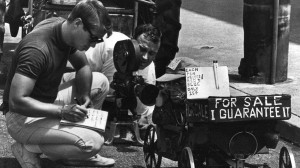
A film crew captures the story of Leo Beuerman. The footage is now part of UM special education professor Jim Payne's most recent research project.
OXFORD, Miss. – As a child, University of Mississippi special education professor Jim Payne bought pencils from a dwarfed, deaf and nearly blind man outside a Woolworth’s store in downtown Lawrence, Kansas. Decades later, that man is the subject of Payne’s latest research project.
“Leo Beuerman: A Legacy,” is a digital compilation of films and interviews examining the 1969 Academy Award-nominated documentary “Leo Beuerman,” which depicted the innovations of a man imprisoned by his own body.
“I never needed a pencil, but I always bought one,” Payne said. “In a way, I pitied him. But, over time, I learned a lot from Leo. How individuals with special needs do not need to be pitied. This project is a celebration of the film and Leo’s life.”
The compilation is the first in a series of video projects for the professor, who, with the help of the UM Media and Documentary Projects Center, is restoring and evaluating special education reels and tapes to create a video history of the field and explore the significance of individual films.
Payne began with the Beuerman story because of his childhood memories of the man. Beuerman, in addition to his other disabilities, could not walk and navigated the sidewalks on a wooden cart he built himself. Despite tremendous challenges, he managed to operate a small business from 1952 to 1968 selling pens, pencils and refurbished watches – which he taught himself to repair – on the streets.
Every day, Beuerman drove into town on a farm tractor equipped with a custom pulley system he designed to raise and lower himself and his cart to the street. Unofficially, the city allowed Beuerman his own parking spot downtown to make his process easier. A bronze plaque hangs near the sidewalk where he operated.
“When Dr. Payne showed me some of the Leo footage, I thought it was such an incredible story about how this guy lived every day of his life,” said Matthew Graves, a UM documentary producer and director who has helped with the project for two years. “The will it must have taken to do that is amazing.”
Released this year by the St. Louis-based Phoenix Learning Group, the project was inspired when Payne found a copy of the documentary in a box of decades-old 16mm films on mental disorders from the University of Virginia libraries.
“When technology switched from reels to VHS tapes, a lot of educational films were lost, thrown out or burnt,” Payne explained. “So when they asked me if I wanted them, I said yes, but I wasn’t quite sure what to do with them at the time.”
Payne and Graves are also developing a documentary tentatively called “Special Education on Screen 101” to examine the evolution of American society’s depiction of those with special needs.
The collection will begin in the 1940s and 1950s – when terms like “idiot,” “imbecile” and “moron” were used clinically – and continue through the 1960s, 1970s and 1980s when, as Payne points out, filmmakers started to humanize people with special needs and identify strengths despite disabilities. It will end at present day.
“When you read the history of special education, it can be a little boring,” Payne said. “But when you can watch it, you can start to see how each decade we change the way we treat people with special needs.”
Payne will host a public screening of “Leo Beuerman: A Legacy,” and a free luncheon on at 11:30 a.m. Tuesday (July 10) at the Water Valley Country Club. The Beuerman compilation is also available for download online.
For more information about the film “Leo Beuerman: A Legacy,” visit http://leobeuerman.com/.